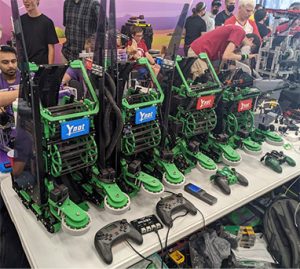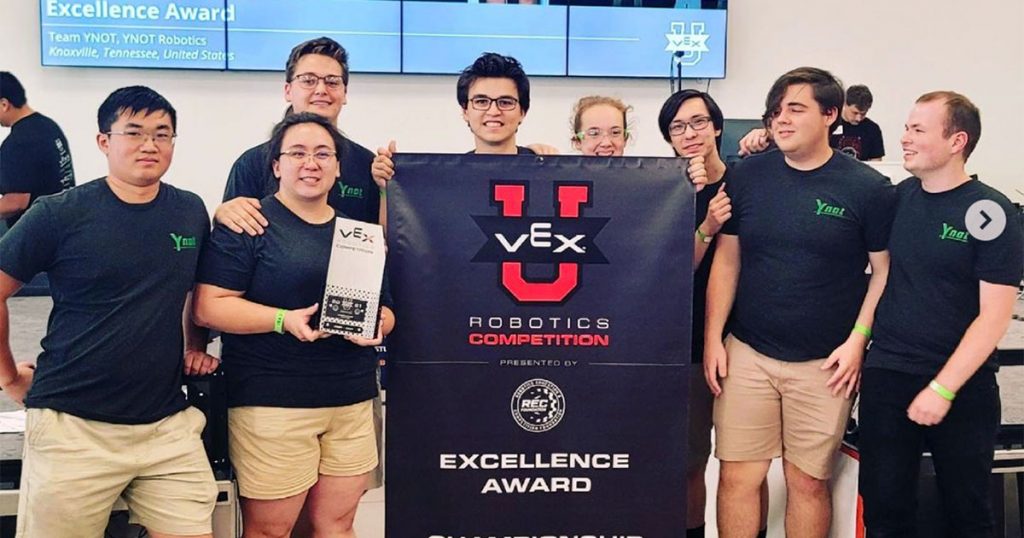YNOT Robotics Team Wins World Championship
YNOT, UT’s Vex University Robotics Team, earned the title of World Champions at the 2021 VEXU Robotics World Championship in Greenville, Texas. The team also earned the Excellence Award, the highest award presented in the VEX Robotics competition. This award is presented to the team that exemplifies overall excellence in building a high-quality robotics program including design innovation, build quality, autonomous programming, engineering design process, personal interview, and documentation through an engineering notebook.
Grant Kobes, senior in industrial and systems engineering, is the founder and lead designer for YNOT. He launched the team four years ago as a project for his Honors Leadership Studies minor through the Honors Leadership Program. His goal was to create an opportunity for UT engineering students to gain hands-on experience with the engineering design process.
 “Competitive robotics hones essential skills that all young engineers must possess,” said Kobes. “The ability to approach a problem using the engineering design process, to fabricate a prototype, program, test, and relentlessly revise it until the most efficient iteration is achieved.”
“Competitive robotics hones essential skills that all young engineers must possess,” said Kobes. “The ability to approach a problem using the engineering design process, to fabricate a prototype, program, test, and relentlessly revise it until the most efficient iteration is achieved.”
Teams receive the year’s game challenge in April and must have their robots ready for the competition season by early fall. Over 300 teams from universities around the world compete throughout the season for a qualifying spot at the World Championship, where Vex Robotics sponsors include Northrup Grumman, Autodesk, Google, NASA, and Tesla.
Kobes and his teammates have expanded their expertise in product design since the team began. Working in their own laboratory on campus, students custom create ninety percent of the parts for their robot. They fabricate the parts using a set of 3D printers, a CNC mill, and metal/polycarbonate.
In order to run this year’s complex “tether bots,” Kobes designed custom circuit boards to control pneumatics, read encoder and gyro values, run informative RGB LED strips for driver feedback, and calculate odometry motor instructions which are relayed back to the motor controller and produce more accurate autonomous programming.
Their hard work delivered them to the championships and a dramatic few days of competition.
Team YNOT finished the first day fourth in programming skills, but the real battle began during the head-to-head matches on day two. They bested Vaughn College in their first pivotal match of the day. Winning this match secured their spot in the elimination rounds and confirmed their position as contenders for the Excellence Award.
Team YNOT went undefeated during qualification matches, muscling their way past competitors from Clemson University, the University of Florida, and Team SPARK, a conglomerate of students from Texas.
One tense moment came when YNOT’s ball intakes malfunctioned during the match against Clemson.
“It was a gut-wrenching experience”, said team VP Clare Remy. With only a three-minute timeout available, the team began disassembling the robot on the floor of the event center.
“For what seemed like forever, Grant sat in a pile of screws, nuts, wires, and motors, dexterously implementing every solution the team suggested,” said Remy.
In that short time span, Kobes customized two VEX stock motors and installed them on the bot, then cut and installed new wiring while programmer Brandan Roachell feverishly adjusted code. Roachell then had to perform a dry upload of the entire performance code in the seconds that remained.
YNOT placed their robot on the field for the quarterfinal match with no time to test the changes. Fortunately, the modifications were successful and the team powered their way to the finals.
Facing the 2019-2020 VEXU world champions from Purdue University, team YNOT was the obvious underdog. Because the champion was determined by the best of three matches, team YNOT gambled on a new game strategy—bringing their pair of tether bots into the first match.
“We have been working on these bots all year,” said Kobes. “They move into position during the autonomous programming round and unfold to block an entire half of the field.”
Purdue was stunned. YNOT took the first match.
“From the moment that we won the first match of finals, a wave of possibility washed over us,” said Remy. “As did an overwhelming sense of support from the other teams in the room.”
The rest is history. Team YNOT also accomplished an unprecedented feat by winning both the competitive portion of the event and the highest judged award, the Excellence Award.
“I am most proud of the Excellence Award, because it represents the efforts of the entire team,” said Kobes. “YNOT optimizes our performance using designers from Tickle’s mechanical engineering department, programmers from the computer science department, an automation expert from ISE, and an archival specialist from anthropology who compiles our engineering notebook. One of our best builders is actually a wildlife and fisheries major. Our success demonstrates what UT students can achieve when they work in collaboration.”
Kobes and fellow team members will take that fortitude with them into the workplace in the coming years.
With a World Championship title under his belt, Kobes is now focusing on the legacy he leaves at the college by ensuring that team YNOT continues after he graduates. Under the direction John Kobza, ISE department head and team mentor, Kobes has already begun to mentor and train team members in specific areas which will allow them to assume additional leadership positions in the organization.
